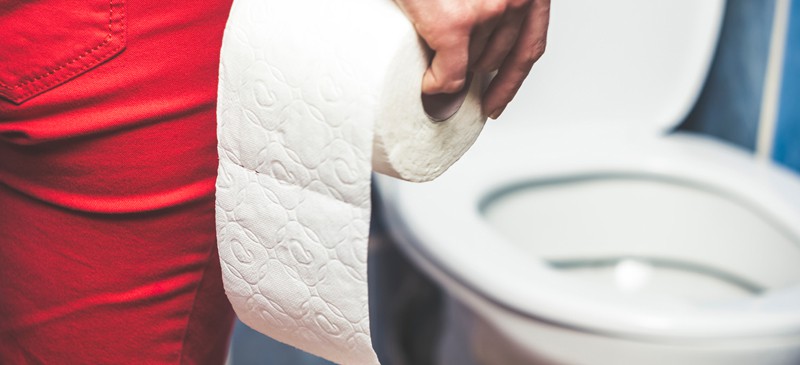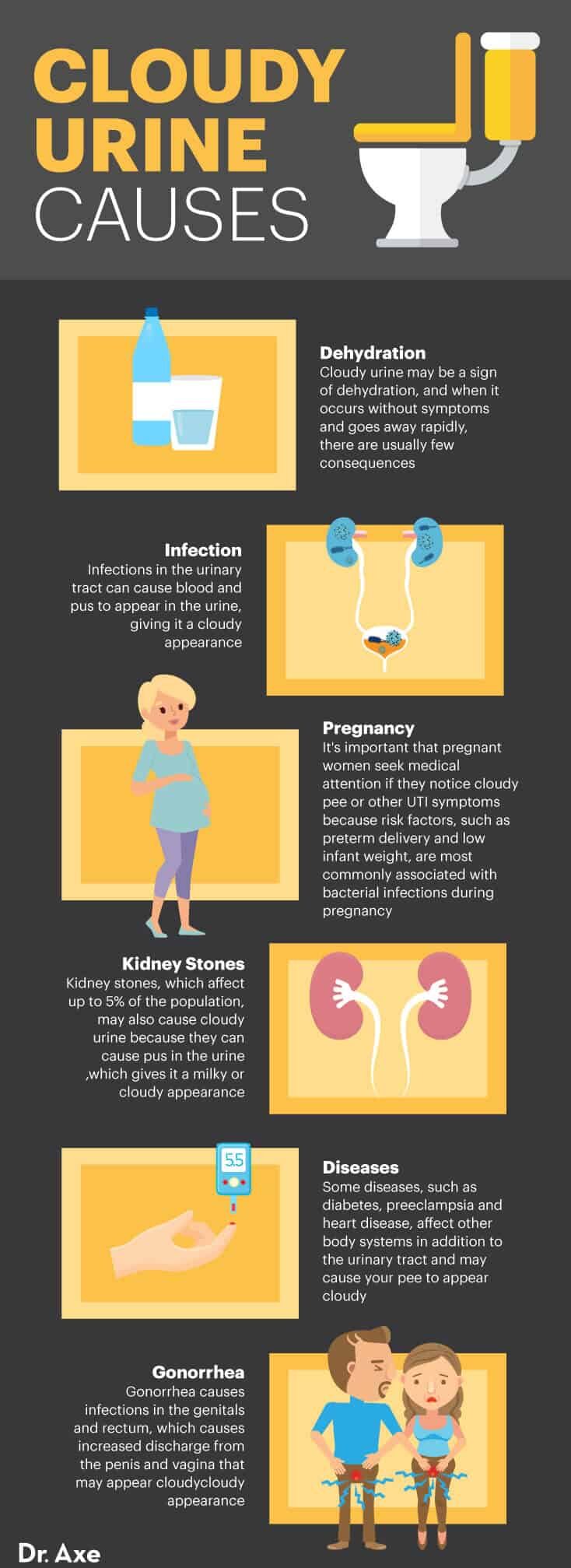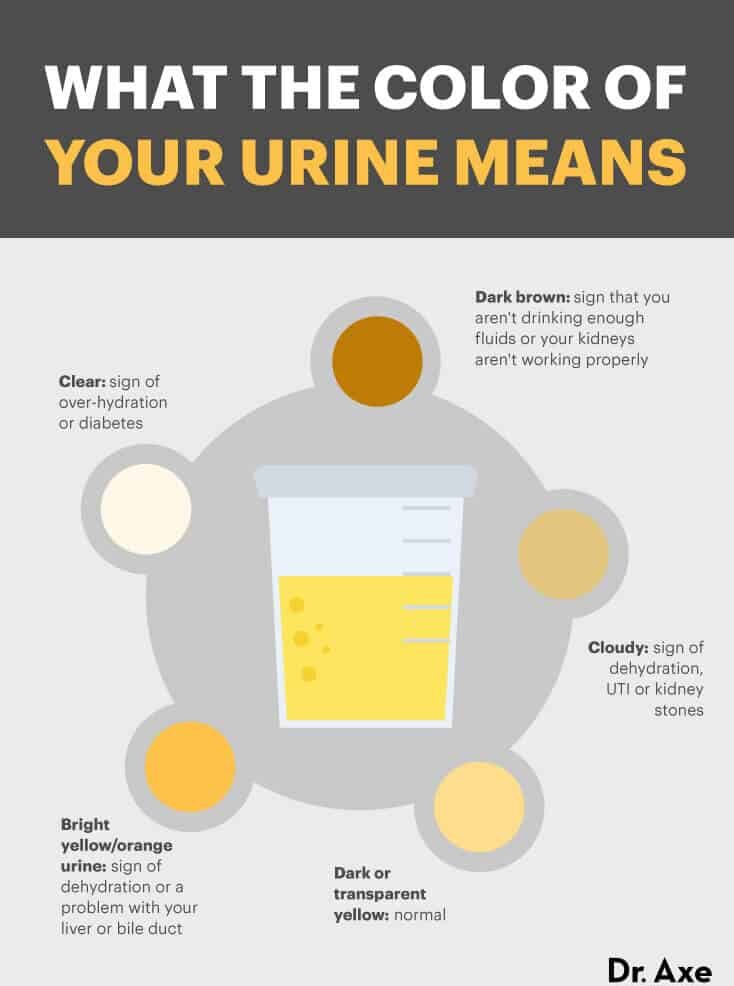Is Cloudy Urine a Danger? Causes, Diagnosis, Remedies
- What Is Cloudy Urine?
- Causes
- Diagnosing Cloudy Urine
- Symptoms of a Bladder Infection
- Natural Remedies
- Precautions

Throughout the history of medicine, the color of urine has been a valuable diagnostic tool, as it reveals crucial information about one’s health. The elimination of urine is of utmost importance for various bodily functions. It helps regulate the balance of water in the body and gets rid of substances that are produced during metabolic processes and are no longer needed by the body. The color, odor, and amount of urine can indicate whether there is something amiss. The ideal healthy urine color is a straw yellow hue, and anything darker or lighter, such as cloudy urine, may suggest that you have a health issue at hand, like a urinary tract infection (UTI).
Cloudy urine can be among the common symptoms of a UTI, and UTIs are among the most common bacterial infections affecting women. Cloudy urine also occurs in men and children, and there are numerous other possible reasons for cloudy urine in addition to UTIs.
To make a self-diagnosis using the color of your urine and your overall pee health, you need to be aware of the possible causes of cloudy urine and the best ways to treat or prevent health problems associated with cloudy pee.
What Is Cloudy Urine?
Urine is a liquid waste product that is filtered from the blood by the kidneys, stored in the bladder, and expelled from the body during urination. Since urine is a compilation of the waste that has been present in your body, it serves as a good indicator of your current health condition. Normal, healthy urine is clear and has a light yellow, straw-like color. When urine becomes murky, foamy, or opaque, it is often referred to as cloudy urine. White cloudy urine, cloudy yellow urine, and dark cloudy urine are all different variations of abnormal urine that is cloudy. The answer to the question, “Why is my urine cloudy?” can have several explanations, so let’s explore the possibilities now.
Causes
There are a few possible causes of cloudy urine, some more serious than others.
1. Dehydration
Do you have cloudy urine with no pain present? It may be a sign of dehydration. When this occurs without symptoms and quickly resolves, there are usually few consequences. To avoid a health scare, be sure to drink plenty of fluids throughout the day.
2. Infections, often UTIs
Certain health conditions can cause excess protein or crystalline substances in the urine, which leads to it appearing cloudy or foamy. Infections in the urinary tract can cause blood and pus to appear in the urine, giving it a cloudy appearance. A specific type of urinary tract infection called interstitial cystitis (which is a bladder infection) may cause cloudy or murky urine, along with painful urination. Cloudy or murky urine during pregnancy may be due to a urinary tract infection, as UTIs are the most frequent medical complication of pregnancy. It is essential that pregnant women seek medical attention if they notice cloudy urine during pregnancy or other UTI symptoms, as risk factors such as preterm delivery and low infant weight are most commonly associated with bacterial infections during pregnancy.
3. Kidney problems
What if you experience cloudy urine but don’t have a UTI? Kidney stones, which affect up to five percent of the population, or a kidney infection can also cause cloudy urine because they can cause pus in the urine, which gives it a milky or cloudy appearance. Kidney stone symptoms can be extremely painful and similar to the symptoms of a bladder infection. Because a kidney stone sometimes has jagged edges, it can tear against the ureter as the body tries to pass it. The tearing can cause an infection, which produces pus, thereby causing the urine to appear cloudy.
4. Certain diseases
Some diseases, such as diabetes, preeclampsia, and heart disease, affect other body systems in addition to the urinary tract and may cause your pee to appear cloudy.
5. STDs
STDs that can cause urine to become cloudy include gonorrhea and chlamydia. Cloudy urine may be a symptom of gonorrhea, a sexually transmitted disease (STD) that can infect both men and women. Gonorrhea causes infections in the genitals and rectum, which leads to increased discharge from the penis and vagina. The discharge mixed with urine may make urine appear cloudy. Chlamydia, another very serious STD that may go undetected, can also cause cloudy urine.

Diagnosing Cloudy Urine
Paying attention to signs and symptoms that accompany cloudy urine can help you make a diagnosis. For instance, if you experience pain along with the murky urine, you may have a urinary tract infection or kidney stones. Both UTIs and kidney stones can cause cloudy urine and back pain. Pain from a urinary tract infection is typically present during urination, and you may also have foul-smelling urine. Passing a kidney stone can be painful whether you are urinating or not. Kidney stone pain can be agonizing until you pass the stone or stones. Cloudy urine doesn’t always mean that you have a serious health condition or infection. If you notice your urine is cloudy for several days in a row, you may want to see your healthcare provider. When you first notice that your urine is cloudy, think about the medications you take, what you have eaten that day, whether you have had sex recently (as discharge mixed with pee can make it appear cloudy), and how you feel. A urinalysis is a test of a urine sample that will reveal any problems in the urinary tract and other body systems. It assesses the color, clarity, and concentration of urine, as well as the chemical composition. A urinalysis will also detect the presence of bacteria in the urinary tract.
Symptoms of a Bladder Infection
Cystitis, which is a bladder infection, is the inflammation of the bladder that is often referred to as a urinary tract infection. It is usually caused by bacteria that enter the urethra and reach the bladder. Once the bacteria are in the bladder, they attach to the bladder wall and multiply, leading to inflammation of the tissue lining the inside of the bladder. A common sign of cystitis is cloudy urine, along with discomfort or pain in the bladder and the surrounding pelvic region. The symptoms of uncomplicated cystitis include frequently having to go to the bathroom and a stinging or burning feeling when urinating. Many women with bladder infections find that it is particularly painful when their bladders are almost or completely empty. Some other common symptoms of a bladder infection include:
- Having a sudden need to urinate
- Feeling like you have to urinate but only a small amount of urine comes out
- Difficulty holding back urine
- Urine that is cloudy in color
- Urine that has blood in it
- Urine that has an unusual smell
Natural Remedies
Cloudy urine is commonly caused by an infection, which can be treated with antibiotics. Some natural treatments to clear up clouding of the urine and prevent a UTI include probiotics, cranberry, acupuncture, and more.
1. L-arginine
L-arginine is a type of amino acid that helps with detoxification and fights inflammation. It also has antibacterial and immune-modulating properties. L-arginine can play an important role in treating an overreactive bladder because it helps regulate and regenerate bladder cells. When L-arginine is converted into nitric oxide, it can also inhibit the growth of different microorganisms that may cause UTIs and symptoms like cloudy urine.
2. Probiotics
A UTI is caused by bacteria that colonize in the urinary tract. Probiotics are used to help repopulate the normal flora of the GI tract. They aid the gastrointestinal tract or vagina to resist invasion and adhesion of pathogens like E. coli, enhance the immune system, increase the population of good bacteria, and regulate the intestinal flora.
3. Quercetin
Quercetin is a type of flavonoid antioxidant that plays a key role in fighting inflammation. While you can get plenty of quercetin from eating a healthy diet with foods such as leafy greens, berries, and broccoli, some people also take quercetin supplements for their strong anti-inflammatory effects. Quercetin can help regulate inflammation in the bladder and lower pain associated with infections. Research shows that people experiencing bladder pains from infections, which cause cloudy urine, an urgent need to urinate, inflammation, and burning, have fewer symptoms when taking quercetin supplements.
4. Parsley
Derived from the petroselinum plant, parsley has been used as a natural detox remedy and anti-inflammatory agent. Parsley extract has shown to possess diuretic effects in addition to anti-inflammatory properties, which are essential in the treatment of UTIs.
5. Garlic
Garlic is well-known for its antibacterial, antifungal, and antiviral properties, which are attributed to the presence of allicin. Garlic also exhibits anti-inflammatory, antioxidant, and immune-boosting effects that aid in the treatment of urinary tract infections that can cause cloudy urine. Research suggests that the combination of garlic oil and parsley in pill form can inhibit bacterial growth and reproduction.
6. Cranberries
Some research suggests that cranberry consumption demonstrates a decrease in UTI recurrence over a period of six months. A 2014 study published in Clinical Infectious Diseases found that cranberry prophylaxis was effective in improving quality of life in patients with a urinary tract infection, and it was more cost-effective than antibiotics.

7. Avoid Foods that Exacerbate Symptoms
A study published in the British Journal of Urology found that after patients filled out three-day food and voiding diaries, they revealed that the intake of certain foods and fluids exacerbated UTI symptoms and increased painful bladder symptoms within two to four hours of consumption. The symptoms were reduced with the elimination of these common problematic foods: alcoholic beverages, carbonated drinks, caffeine, spicy foods, tomatoes, citrus fruits, and vinegar. Arylalkylamine-containing foods, such as bananas, beer, cheese, mayonnaise, nuts, onions, raisins, sour cream, wine, and yogurt, have also shown to increase symptoms of a possible bladder infection. So it’s a good idea to avoid these foods that cause cloudy urine and other unwanted symptoms.
8. Drink Plenty of Water
According to research published in the European Journal of Clinical Nutrition, bacterial destruction from the urinary tract is partially dependent on urine flow and voiding frequency. Studies show that chronic low fluid intake may play a crucial role in the pathologies of urinary tract infections and other diseases of the urinary system (like bladder cancer and kidney disease). Adequate hydration is important and may improve the results of antimicrobial therapy for UTIs. Also, it’s important to urinate frequently to help flush bacteria from the bladder. Holding urine for a long time allows bacteria to multiply within the urinary tract, resulting in UTIs like cystitis.
9. Acupuncture
A 2002 study published in the American Public Health Association indicated that acupuncture reduced the cystitis recurrence rate among cystitis-prone women to half the rate among untreated women. Also, women in the acupuncture group exhibited reductions in residual urine, which is a risk factor in the pathogenesis of recurrent lower UTIs among postmenopausal women and maybe even among adult women in general.
10. Preventive Measures Related to Sexual Intercourse
Research published in the Sultan Qaboos University Medical Journal shows that preventive measures related to sexual intercourse may reduce the UTI recurrence rate. Women are encouraged to clean the genital areas before and after sex and to wipe from front to back, which helps reduce the spread of E. coli from the perigenital area to the urethra. Avoiding multiple sexual partners reduces the risk of both UTIs and sexually transmitted infections. Women are also encouraged to avoid spermicidal contraceptives, diaphragms, and vaginal douching, which may irritate the vagina and urethra and encourage the entry and colonization of bacteria within the urinary tract.
11. Avoid Common Skin Allergens
A study conducted at the University of Michigan School of Public Health found that it’s best to avoid skin allergens on or around the genital area, such as bubble bath liquids, bath oils, vaginal creams and lotions, deodorant sprays, or soaps. Many of these contain toxic synthetic scents. These products can alter vaginal flora and ultimately result in UTIs and symptoms like cloudy urine.
Precautions
Although cloudy or murky urine does not always mean you have a serious health problem, if you notice that the cloudy or murky color persists for several days, even after you’ve tried some home remedies to reverse the issue, it’s a good idea to reach out to your healthcare provider. Some medical conditions that cause clouding of the urine, like sexually transmitted diseases or kidney problems, shouldn’t be ignored, and they typically won’t go away on their own. Only a proper urinalysis that is taken at a medical lab or doctor’s office can accurately diagnose potential medical conditions.
Final Thoughts
- The color of urine has been a valuable diagnostic tool since the dawn of medicine, as it reveals important information about your health.
- There are many possible causes of cloudy urine. It may be a sign of a urinary tract infection, dehydration, kidney stones, sexually transmitted diseases, or other health conditions.
- If you have cloudy urine and no other symptoms, then you may be dehydrated.
- If you have cloudy pee, discomfort or pain around the bladder, a need to urinate frequently and urgently, and a feeling that your bladder is never empty, you may have a bladder infection.
- Some natural remedies to help clear up cloudy urine and prevent a UTI include probiotics, cranberry, acupuncture, and good hygiene, especially after sexual intercourse.




